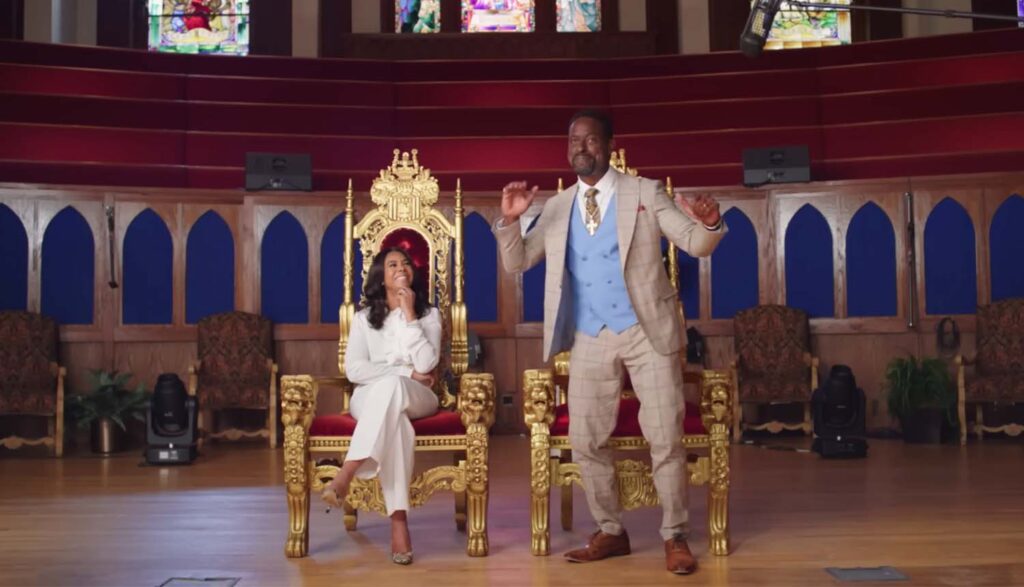
In one of his incisive bits about religion, George Carlin observed that God “always needs money.” The implication is that the deity’s clerics are also in permanent want of funds, but the main characters of Honk for Jesus, Save Your Soul—Lee-Curtis Childs (Sterling K. Brown), a captivating Southern Baptist preacher, and Trinitie (Regina Hall), his publicly steadfast wife—aren’t hurting for cash. They live in a luxurious mansion outside of Atlanta, they drive a Cadillac Escalade, and their closets are filled with Prada. (Lee-Curtis’ gold watch gleams so brightly, you half-expect him to tell someone that it “cost more than your car.”) No, what this power couple really craves—what they desire beyond favorable clippings in the press or dollar bills in the collection plate—is an audience.
They used to have one; with Trinitie seated at his side in a gold-enameled throne, Lee-Curtis would routinely preach to upwards of 5,000 disciples at Wander to Greater Paths, their so-called “megachurch.” But then something happened—something initially alluded to only as “misconduct”—and now they bustle about in their Georgia Xanadu, breathlessly plotting their reemergence. Honk for Jesus, which is the feature debut of writer-director Adamma Ebo (based on her short film), chronicles the Childses’ painstaking attempt to reacquire their congregation (and their relevance), even as it also gradually unveils the scandal that led to their downfall.
Trinitie and Lee-Curtis are fictional characters, but Ebo endeavors to inscribe their story with a grain of truth by framing the picture as a mockumentary. In the screenplay’s telling, a renowned filmmaker named Anita, who employs an unfussy style in the vein of Frederick Wiseman—she is never seen and rarely heard, preferring to silently engage in what Trinitie describes as a “fly on the wall” approach—has traveled to the Childses’ muggy neighborhood with a camera crew to document their energetic efforts. For Ebo, this is an ostensibly comic approach (think Drop Dead Gorgeous) to fairly serious material, though she doesn’t fully commit to the gimmick. While most of the scenes in Honk for Jesus unfold under the pretense of loose, handheld realism (as though Barbara Kopple were directing), quite a few sequences take place in private spaces where no camera operator or sound technician could feasibly gain access.

This raises the question of why Ebo bothered to deploy the mockumentary trope at all. The answer, I suspect, lies in how Trinitie and Lee-Curtis—who are regularly outfitted in splendidly garish suits and hats—have dedicated themselves to a life and career that is so thoroughly predicated on performance. As celebrity ministers, they have cultivated a persona—a combination of spiritually driven preaching and unashamedly enthusiastic peacocking—that extends beyond their weekly trips to the cathedral. In all walks of public life—in the shopping mall, at the hair salon, in the parking lot—they must maintain their air of irrepressible success and buoyant devotion. They are constantly playing the role of themselves, which is why they repeatedly ask Anita to stop rolling her camera, lest the raw footage expose them as anything other than who they present themselves to be.
Honk for Jesus runs a brisk 102 minutes, but the script still parcels out plot details patiently, allowing for subtle pivots in tone and theme. The particulars of Lee-Curtis’ disgrace are revealed not through a dramatic flashback or an explosive confrontation, but via the accretion of seemingly offhand moments: a stray glance at a food court, an unbuttoned shirt on a basketball court, a horrifically awkward sex scene. (Ebo exhibits no compunction in exploiting Brown’s chiseled stomach.) A sequence in which he rails against the so-called “homosexual agenda” at first seems extraneous, but it later proves critical, as we discover that he’s been crippled by accusations not just of illegality, but hypocrisy.

Rather than structuring the movie as a damning exposé, Ebo strains to blunt the seriousness of her themes with daubs of cringe comedy. The results are mixed. When she goes broad, as when the Childses burst into an impromptu rendition of a crunk hit or when Lee-Curtis twists Trinitie’s desperate salesmanship into crude humiliation, she struggles to land belly laughs. Straightforward dialogue scenes, on the other hand, are amusing in how they illustrate the wide gap between the characters’ external and internal selves; virtually every conversation they have—in particular those with rival married pastors (played by Nicole Beharie and Conphidance) who threaten to siphon the Childses’ congregation to their own new megachurch—is passive-aggressive, the leads smiling tightly and laughing mirthlessly when they clearly want to scream.
When it comes to your own reaction, Honk for Jesus is less likely to produce shrieks and cackles than winces and chuckles. As a satire, it’s competent but unexceptional, providing few insights into the duplicity of commodified religion that haven’t recently graced either the big screen (The Eyes of Tammy Faye) or the small (The Righteous Gemstones). It gestures toward topicality, particularly in considering the factors of race and class in the age of #MeToo—at one point, somebody murmurs something about society’s compulsive need to tear down successful Black men—but its resonance is muted.

Where the movie becomes most interesting is in its depiction of matrimony. “Marriage is hard work,” Lee-Curtis preaches, and it’s perhaps the only thing he says from the pulpit that carries the currency of honesty. As with most religious institutions, Wander to Greater Paths’ foundation is inherently patriarchal, compelling Trinitie to embody the role of devoted spouse, but in private her relationship with her husband is more complicated. She is neither an accomplice nor a victim, or maybe she’s both, and their fraught dynamic is a constant churn of affection, resentment, respect, and shame.
The emotional complexity of the Childses’ marriage stems in significant part from the lead performances, both of which are pitch-perfect. Brown, ever so slightly warping the aw-shucks magnetism he displayed on This Is Us, is indecently charismatic and also just plain indecent, illustrating just how easily proselytization can shift from virtuous to sinister. For her part, Hall’s perpetual plastic smile manages to both conceal and convey a lifetime of inner turmoil; you want to assuage Trinitie’s anguish, even as you fear the ferocity of her judgment.
And if the central message of Honk for Jesus, Save Your Soul—that organized religion is just another craven capitalistic enterprise—is unlikely to convert any wayward souls, the movie at least has the courtesy not to be too preachy. Rather than spouting fire-and-brimstone vitriol, it smuggles in its ideas through care and contemplation. It’s hardly the stuff of scripture, but it bears the indicia of intelligent design.
Grade: B-
Jeremy Beck is the editor-in-chief of MovieManifesto. He watches more movies and television than he probably should.
